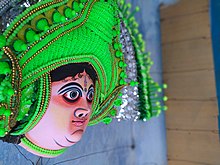| Purulia Chhau mask | |
|---|---|
| Geographical indication | |
 | |
| Alternative names | Chhau dance mask |
| Description | Chhau mask is used for Chhau dance in Purulia |
| Type | West Bengal folk cultural art |
| Area | Purulia and nearby villages |
| Country | India |
| Registered | 28 March 2018 |
| Material | Clay, soft paper, diluted glue, cloth, mud, fine ash powder etc. |
The Chhau mask is a traditional cultural heritage of Purulia in the Indian state of West Bengal.[1] The Chhau mask of Purulia is registered on the List of Geographical Indications.[2] As the basic difference of Purulia Chhau the mask is unique and traditional.
It is the mask which differentiates the Purulia Chhau from its other two significant branches: the Seraikella Chhau of Jharkhand and the Mayurbhanj Chhau of Odisha. The Jharkhand counterpart does involve masks but they are rather simpler, small and evocative, without any of the pompous vibrancy of the Purulia variants.[3] While the Mayurbhanj type is an unmasked form. It is the Purulia form only that uses large evocative masks along with elaborate costumes that intensify the energetic performance, despite the challenges to physicalization.[3]
The mask allows the artists to morph into the character — therefore Anusua Mukherjee notes that when an artists wears a particular mask, he or she “gets into character immediately, transforming into mellow Kartik, fierce Ravana, or Durga’s ferocious lion”.[3] Chhau artist Anil Mahato says, “Shiva danced the tandava : wearing his mask brings in that frisson for me.”[4] One could perhaps imagine the centrality of the mask to Chhau dance with the Thalia or the Melpomene masks used in Greek Comedy and Tragedy theatres respectively, or perhaps the masks used in mystery plays during the middle ages[5]
- ^ "The Official Website of Purulia District". purulia.gov.in. Retrieved 2018-02-12.
- ^ "Bengal handicrafts to get new fillip with GI tags". The Hindu. PTI. 2016-08-16. ISSN 0971-751X. Retrieved 2018-05-15.
- ^ a b c Cite error: The named reference
:0was invoked but never defined (see the help page). - ^ Chau - Wonder Mask, retrieved 2023-02-01
- ^ "A Comparative Study of Chhau Masks of Eastern India and Ancient Greek". StageBuzz. 2019-01-06. Retrieved 2023-02-01.